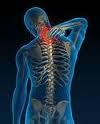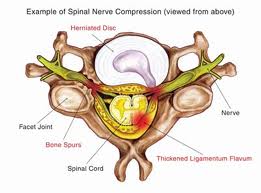The nerves are responsible for transmitting electrical impulses to the brain and vice versa. So an injury or damage caused to the nerves due to the exertion of some kind of pressure or compression leads to a disruption of the impulse responsible for transmitting information along specific nerve pathways. The nerve’s fail to provide and receive signals to and from the brain to other parts of the body and vice versa. The pressure may be exerted on the nerve by the surrounding tissues such as bones, muscles or cartilage. This problem may be witnessed at several sites of the body such as the shoulders, the upper and lower back, the arms and the legs. It is characterized by pain, numbness, tingling or weakness and can be caused by a number of reasons related to bone and nerve injury. Pinched nerve in upper or lower back may either be chronic or acute depending on the underlying cause.

Picture 1 – Pinched Nerve in Back
Source – www.pinchednerveinback.org
Pinched Nerve in Back Symptoms
Page Contents
The symptoms of a pinched nerve in back are determined by the specific kind of nerve affected since different kinds of nerves are assigned different tasks to perform. Some of the most common signs of pinched nerve in back include a feeling of numbness or absence of sensation in the region affected, pinched nerve back pain which may be sharp in nature, and tingling. One may also suffer from paresthesia, which is a ‘pins and needles’ sensation, a burning sensation and pain, twitching and muscle weakness, and a frequent ‘falling asleep’ of the limbs. In cases when a nerve that is directly related to the spinal cord is affected, one may also suffer from coughing and sneezing, which aggravates the pain associated with a pinched nerve. Muscle spasms are a common occurrence in case of the same. Pinched nerve in back of knee is characterized by pain in the joints. Pinched nerve in lower and upper back symptoms also includes stiffness of the muscles down the legs. All these symptoms intensify while sleeping at night. These symptoms serve as an answer to those who pose the question what does a pinched nerve in your back feel like.
Pinched Nerve in Back Causes

Picture 2 – Causes of Pinched Nerve in Back
Source – www.spineuniverse.com
It is not easy to detect a single cause of a pinched nerve in back for the fact that it is caused by a number of reasons such as an injury, a bruise, poor posture, obesity, continuous driving, sports activities and an inflammation of the extremities. Other core factors of a pinched nerve include arthritis, spinal stenosis, bone spurs, herniated disc. It may also be inherited and pinched nerve during pregnancy is a common occurrence. Chronic conditions such as diabetes, osteoarthritis, stress, may also cause pinched nerve in back of head or upper back and neck or lower arm. Piriformis Syndrome is an example of the same problem when it does not involve a herniated disc. Moreover, in some cases, the deficiency of Vitamin D may also trigger the symptoms of the same.
Pinched Nerve in Back Diagnosis
The pinched nerve is first diagnosed by conducting a blood and urine test. An X-ray of the back at the sacral and the lumbar region is recommended for a proper detection of the ailment. It helps to detect any injury, bruise, fracture or the possibility of arthritis that may have given rise to this problem. For further detection of the problem, one may be asked to undergo other advanced imaging tests such as an abdomen and pelvic ultrasonography, a CT scan or an MRI of the spine.
Some other tests that one may be required to undergo for the purpose of facilitating the detection and analysis of pinched nerve problem are electromyography and nerve conduction test. In case of the former test, one measure the electrical discharges of the muscles whereas, in case of the latter, one gets an understanding of the nature of the electrical impulses that pass through nerve pathways. The latter is also known as Nerve Conduction Velocity Test. The latter also aids the treatment of the disorder.
Treatment for Pinched Nerve in Back
For those who are inquisitive to know how to treat or fix a pinched nerve in back, must be enlightened with the fact that the treatment for pinched nerve in back involves physical, clinical and natural remedies. The first and foremost pinched nerve in back remedy is a bracing of the affected area for the purpose of immobilizing the region. The clinical ways of knowing how to get rid of pinched nerve in back include the administration of analgesics such as non-steroidal anti-inflammatory drugs, namely, naproxen and ibuprofen. These are meant to provide pain relief from pinched nerve in back. Corticosteroids are also injected for treating a pinched nerve in back pain.
The medications are corroborated with pinched nerve in back exercises. The exercises for pinched nerve in back intend to stretch and strengthen the muscles of the affected region, thereby providing relief from pinched nerve in back. Specific exercises like shoulder blade extension and are to be performed scapular wall slides Yoga and meditation also fall under the banner of physical ways of treating pinched nerve in back. The Physical therapy also includes various modalities like electric stimulation, ultrasound, and thermal therapy.
When both medical and physical treatments fail to ensure pinched nerve in back relief, one may have to undergo a pinched nerve surgery. However, the surgery type is determined by the area affected. With the help of a surgery, traction rods and devices may be placed inside the spinal cord or the area affected. Another way of treating pinched nerve is to undergo a Jacuzzi water and whirlpool heat therapy in which case heat is applied for the purpose of reducing the inflammation and healing.
The home treatment or remedies for pinched nerve in back include resting on a hard mattress, the application of a hot or cold pack on the area affected, maintaining a diet rich in fibre content and antioxidants like fruit juices. Chiropractic care and vitamin supplements may also help one to counter the disorder.
Moreover, one must take into account some preventive measures such as not wearing high heel shoes, maintaining a good posture while standing and sitting, limiting over stressful activities, and carrying on regular exercises.
All the aforementioned measures if undertaken seriously and followed sincerely, may be extremely helpful in ensuring healing of pinched nerve in back problems.
References
http://www.medicinenet.com/pinched nerve /discussion-324.htm
http://pinchednerveinback.org/
http://www.mayoclinic.com/health/pinched-nerve/DS00879
http://www.1backpain.com/backpinchednerve.htm
http://pinchednerveinlowerback.net/
http://www.ehow.com/way_5755137_exercises-pinched-nerves-upper-back.html
http://www.laserspineinstitute.com/back_problems/treatment_articles/pinched_nerve

I have 5 inch incision lower back surgery 6 weeks ago now I am having terrible pain from a nerve or muscle spasm or both doc did nothing what can I do laying in bed is old now but scared to move too painful n